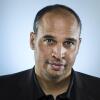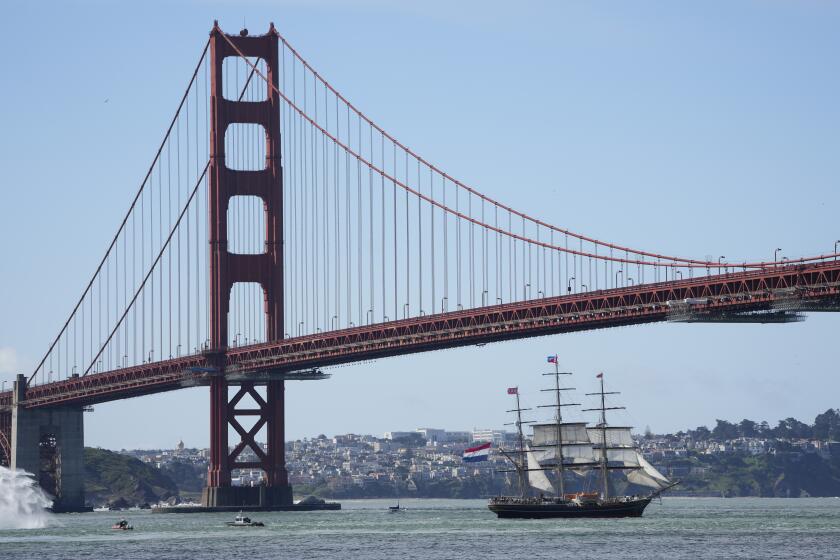He makes a difference, finds redemption
In the cramped, cobwebbed weight room, filled this early morning with soft-eyed high school football players from this city’s hardest parts, Martin Ludlow’s past is but a memory.
Here, every school day morning starting at 6:30, he pushes.
Come on, come on, let’s go . . . do not give up!
He prods.
That’s it, good job . . . lift, lift, don’t think, just lift!
He cajoles.
When you leave here this morning, remember that there are people out there who might challenge you. I’m telling you, walk away! Stay out of trouble, avoid it like a plague.
In the weight room at South L.A.’s Dorsey High, he is not the former city councilman and union chief who fell from grace. Nor is he the felon who pleaded guilty to election fraud.
He is simply “Coach Ludlow,” a volunteer assistant working to keep kids on the straight path with his buzz saw energy, boundless optimism and a humility forged by the crucible of public humiliation.
What a difference a half-decade makes. Five years ago, Ludlow was one of Los Angeles’ most powerful men. He’d spent a career as a behind-the-scenes political operative. He’d worked on Al Gore’s presidential campaign and helped Gray Davis get elected governor. He’d been a trusted aide to Antonio Villaraigosa when the mayor was in the state Assembly. In 2003, Ludlow made his own run for office and was elected to the L.A. City Council.
Soon after, when the head of the Los Angeles County Federation of Labor suddenly died, Ludlow left City Hall to take over the influential workers’ union.
Then, suddenly, prosecutors pressed a case against him in state and federal courts. They’d found evidence that he’d used union workers and union money to help his city council campaign. Ludlow was forced to step down from his union post. He pleaded guilty, went on probation, paid nearly $200,000 in fines and restitution, was barred from public office for four years and made to do 2,000 hours of community service.
What Ludlow did next, however, is instructive. He took full responsibility for what he’d done, blaming no one but himself. And while trying to piece together a living from part-time consulting work, he spent the rest of his time volunteering to make a difference in the lives of kids who need help, in particular the kids of South L.A. and Dorsey High’s football team.
Dorsey, long a football powerhouse, is also one of the city’s toughest schools, located across the street from the hazardous maze of apartments known on the streets as “The Jungle,” where drugs and flying bullets are a part of regular life.
The school had been in Ludlow’s city council district. He had taken his oath of office before a packed crowd on the school’s beaten football field. His soft spot for Dorsey ran so deep he’d started to volunteer for the football team, assisting legendary Coach Paul Knox, well before his sentencing.
Dorsey’s team dresses in a fungus-riddled locker room. The weight room is a crumbling place populated by roaches and black widow spiders. The football field has more weeds and potholes than grass. So Ludlow’s first task as volunteer was to set about creating a nonprofit group that would help back the team and build new facilities.
And because the former councilman is a muscular 43-year-old addicted to lifting weights, his second task was to serve as the team’s strength and conditioning coach, a role he plans to continue as long as the school will have him.
“He’s turned us around,” said Trevize Strickland, a 17-year-old offensive lineman who is already as big as some of the linemen at UCLA and USC. “We take our conditioning more seriously as a team, with the weights and the sprints, with him running with us on the field, and the way he’s there for us, 6:30, every day, no matter what.”
Trevize said Ludlow’s impact runs far deeper than the live-wire workouts he runs. Many of the kids who play for Dorsey don’t have fathers; many are in foster care or group homes. Many are like Trevize, who lives in the Jungle and has lost several friends to gang murders.
“Honestly, what we love about Coach Ludlow is that he’s a father figure, that guy you can go to with your problems,” Trevize said, before ticking off the qualities he admires most: How Ludlow drives kids home to make sure they cross through gang territory safely. How he acts as a wise intermediary with parents. And how, last year, when Trevize was depressed and feeling he needed to find a job to help his struggling family, Ludlow gave a stern answer when told his young charge was considering dropping out of school: “No way, not on your life. It’s not even an option.”
“And here I am,” Trevize gushed on a recent day. “They say college scouts will be looking at me this year.”
------
I’m saddened to write that one of the friends Trevize lost to this city’s plague of violence was Jamiel Shaw II, the Los Angeles High football player gunned down in March on the street where he’d grown up.
It was Jamiel’s killing that deepened my own outrage, spurring a plea to readers that we all do what we can to wrap our arms around communities where the threat of violence hovers as thick as L.A. smog.
The many responses I’ve received from people who’d never thought twice about this cause, and the stories I’ve since heard about people who have long been working to help, have been deeply inspiring. Let’s keep the ball rolling. Together, we can form our own gang, a good gang, a gang that keeps our kids from trouble. We’ll count Martin Ludlow, a civic leader who fell from grace, a humbled man finding his way back by helping others, as one of us.
--
Kurt Streeter can be reached at kurt.streeter@latimes.com. To read previous columns by Streeter, go to latimes.com/streeter.
More to Read
Start your day right
Sign up for Essential California for news, features and recommendations from the L.A. Times and beyond in your inbox six days a week.
You may occasionally receive promotional content from the Los Angeles Times.







